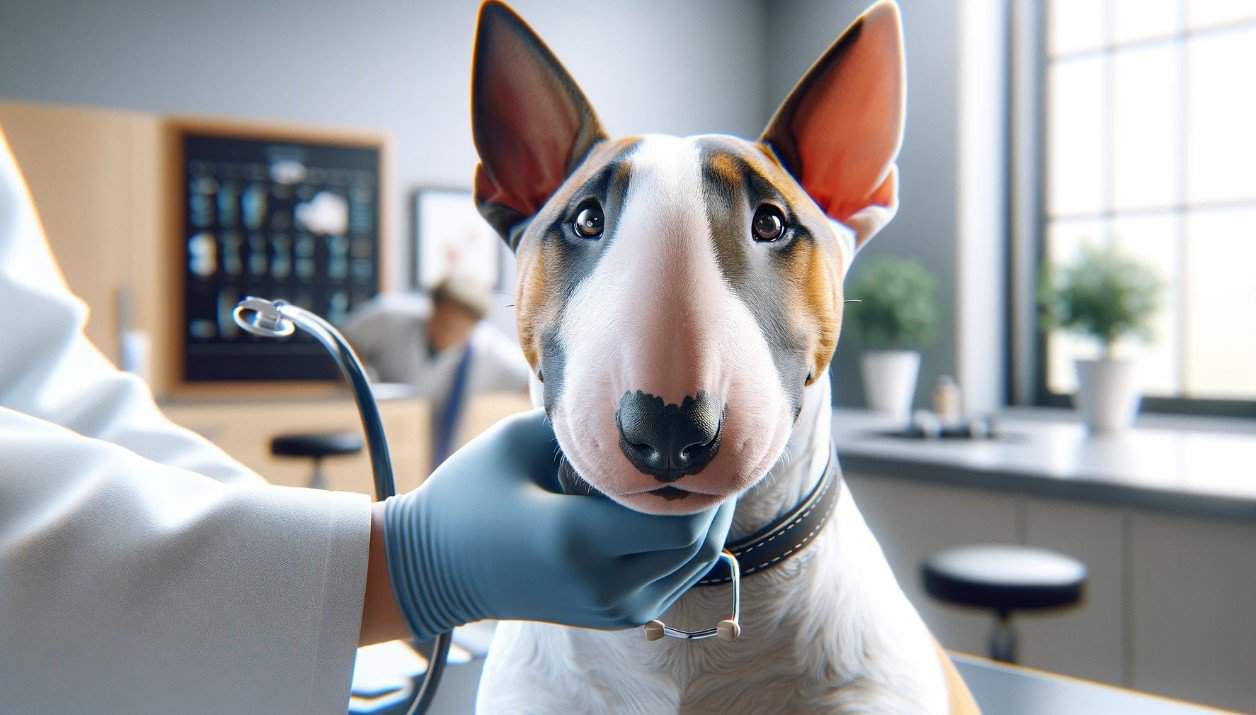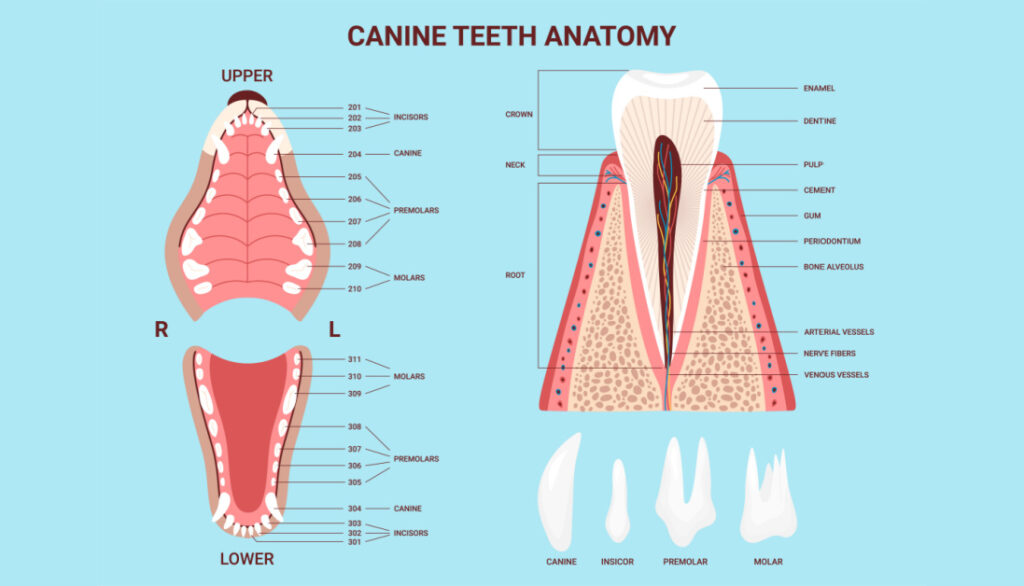Hi there, fellow dog parent! I’m Dr. Candy, your friendly holistic vet. Today, I’d like to talk about a topic that’s close to my heart – Bull Terrier Dental Health. As a vet, I’ve seen how dental issues can affect our fur babies, and it’s something I believe we need to pay more attention to.
You see, your Bull Terrier’s dental health is not just about having a sparkling smile or fresh breath. It’s much more than that. Dental health is closely linked to their overall health. Poor dental hygiene can lead to serious health problems like heart disease and kidney disease. So, let’s explore more about the common dental problems in Bull Terriers, how to spot them, and most importantly, how to prevent them. I’ll also share my holistic approach to oral hygiene and recommend some effective dental chews and products. Let’s help our Bull Terriers flash those pearly whites with pride!

Signs of Dental Disease in Bull Terriers
As a dedicated dog parent, you might be well-versed in Bull Terrier dental health. But, are you aware of the signs of dental disease in these playful pups? Dental disease is a common issue in dogs, especially in Bull Terriers, and can lead to severe health complications if not addressed promptly.
One of the most common signs of dental disease in Bull Terriers is bad breath. While it’s normal for your dog to have a certain level of doggy breath, a foul or unusually strong odor can be a sign of an underlying dental issue.
Another key sign to watch out for is a change in eating habits. If your Bull Terrier is suddenly refusing to eat, dropping food from their mouth, or chewing on one side, it could indicate dental discomfort.
Furthermore, watch out for any changes in the dog’s behavior. Bull Terriers are generally lively and active. If your dog seems lethargic or shows signs of discomfort when playing with chew toys or during meal times, it could be a sign of dental disease.
Other signs include red, swollen or bleeding gums, yellow or brown buildup on the teeth (tartar), excessive drooling, and pawing at the mouth. In more severe cases, you might notice loose or missing teeth.
Dental disease can be painful for your furry friend, but the good news is that it’s preventable. Regular teeth cleaning, a good diet, and the right chew toys can go a long way in maintaining your Bull Terrier’s dental health.
Remember, early detection is key. If you notice any of these signs, it’s important to make an appointment with your vet as soon as possible. Regular check-ups can also help to detect dental disease in its early stages, making it easier to treat and manage.
In my holistic approach to veterinary care, I always emphasize the importance of understanding your dog’s unique needs and behaviors. This will not only help you to detect signs of dental disease early but also ensure your Bull Terrier lives a long, happy, and healthy life.
Key takeaway: Regularly monitor your Bull Terrier’s dental health and seek veterinary care if you notice any changes in their breath, eating habits, behavior, or the appearance of their gums and teeth.
Common Dental Health Issues In Bull Terriers
As a veterinarian, I often see Bull Terriers with various dental health problems. Understanding these common issues can help you take better care of your pet’s oral hygiene. Here are the most common Bull Terrier Dental Health issues:
- Periodontal Disease: This is a common dental issue in Bull Terriers. It’s an infection of the structures around the teeth, which includes the gums, periodontal ligament, and alveolar bone. Left untreated, it can lead to tooth loss.
- Broken Teeth: Bull Terriers love to chew, and this can sometimes lead to broken or fractured teeth. These can be painful and can lead to infections if not treated promptly.
- Gingivitis: This is inflammation of the gums and is often the first stage of periodontal disease. Symptoms include red, swollen gums and bad breath.
- Oral Tumors: While less common, Bull Terriers can develop oral tumors. Regular dental check-ups can help detect these early.
Remember, Bull Terrier Dental Health is crucial for your pet’s overall well-being. Regular dental check-ups, proper diet, and good oral hygiene can help prevent these common dental issues.
As a responsible pet parent, it’s essential to be aware of these issues and seek veterinary care if you notice any changes in your Bull Terrier’s oral health.

Conventional Dental Health Treatments
When it comes to Bull Terrier Dental Health, conventional treatments play a crucial role in maintaining your pet’s overall health. Let’s delve into some of the standard procedures.
Anesthetic Dental Cleanings
Anesthetic dental cleanings are a common procedure performed by veterinarians. This procedure involves your Bull Terrier being put under anesthesia so the vet can conduct a thorough cleaning of their teeth and gums. This process helps remove plaque and tartar build-up, which are the main culprits behind most dental diseases.
While this procedure is beneficial, it’s important to note that anesthesia carries its risks, especially in breeds like Bull Terriers that are prone to certain health issues. These include heart problems, drug sensitivities, and seizures. Therefore, it is essential to have a detailed discussion with your vet about your dog’s health history before proceeding with an anesthetic dental cleaning.
Potential Individual Health Obstacles
Every Bull Terrier is unique, and some may face individual health obstacles that could make dental treatments more challenging. For instance:
- Heart problems: If your Bull Terrier has a known heart condition, anesthesia could pose a risk. Your vet may need to adjust the anesthetic protocol or consider other dental health alternatives.
- Drug Sensitivities: Bull Terriers can be sensitive to certain drugs used during dental procedures. It’s vital to inform your vet about any known drug sensitivities.
- Seizures: Dogs with a history of seizures may be at a higher risk during anesthetic procedures. Your vet may need to adjust the anesthesia protocol accordingly.
- Extreme Age: Older Bull Terriers may face additional risks during anesthesia. Your vet will likely conduct a thorough health check and may recommend regular dental cleanings to prevent severe dental issues.
In conclusion, maintaining your Bull Terrier’s dental health is crucial. Conventional treatments like anesthetic dental cleanings can be beneficial, but it’s important to be aware of your pet’s individual health obstacles. Always consult with your vet to ensure the chosen dental health treatment is the best fit for your Bull Terrier’s specific needs.
When it comes to maintaining your Bull Terrier’s dental health, I firmly believe in a holistic approach. This involves focusing on diet and supplements that can naturally promote oral hygiene and prevent common dental issues.

Diet: Low Carbs, Avoid Added Sugars, Enzymes In Fresh Food
One of the most effective ways to maintain your Bull Terrier’s dental health is by managing their diet. Feeding your dog a diet low in carbohydrates and free from added sugars can significantly reduce the risk of dental problems.
- Low Carbs: High-carbohydrate diets can lead to plaque buildup on your Bull Terrier’s teeth, which can result in periodontal disease. By feeding your dog a diet low in carbs, you can help prevent this issue.
- Avoid Added Sugars: Just like in humans, sugar can cause tooth decay in dogs. Avoiding added sugars in your Bull Terrier’s diet can help maintain their dental health.
- Enzymes In Fresh Food: Fresh foods, particularly raw fruits and vegetables, contain natural enzymes that can help clean your dog’s teeth and promote oral health. Chewing on crunchy vegetables like carrots can also provide a natural tooth brushing effect.
Oral Health Specific Probiotics
Probiotics are beneficial bacteria that can support your Bull Terrier’s overall health, including their oral health. Specifically, oral health-targeted probiotics can help balance the bacteria in your dog’s mouth, preventing the overgrowth of harmful bacteria that can lead to dental diseases.
I highly recommend Probiora for Dogs, an oral health-targeted probiotic. This product is designed to support oral health by maintaining a healthy balance of bacteria in the mouth. It’s easy to use – simply sprinkle it on your dog’s food once a day.
Incorporating these holistic approaches into your Bull Terrier’s routine can significantly improve their dental health. Remember, a healthy mouth is a key component of your dog’s overall wellbeing. So, invest in their dental health today for a happier, healthier Bull Terrier tomorrow.

Recommended Dental Chews & Products For Bull Terriers
When it comes to Bull Terrier dental health, not all products are created equal. Despite what commercials might have you believe, many of the popular dental chews on the market today fall short of their promises. They may seem like a convenient solution, but the reality is that these products often contain a long list of artificial ingredients that can be harmful to your furry friend.
Commercial dental chews often feature hard-to-pronounce additives and fillers that offer minimal dental benefits. Worse, they can lead to digestive issues and potentially trigger allergic reactions. Additionally, many drinking water additives marketed for dental health can disrupt the balance of beneficial bacteria in your dog’s gut, leading to further health complications.
But don’t worry, there’s a healthier way to maintain your Bull Terrier’s dental hygiene. I recommend opting for natural dental chews and products that serve a dual purpose – they are not only tasty treats but also act as natural teeth cleaners.
Dr. Candy’s Recommended Dental Chews & Products
For the optimal Bull Terrier dental health, I suggest you choose single-source natural proteins like tendons, raw marrow bones, and bully sticks. These are not only delicious for your pet, but they also help to scrape away plaque and tartar build-up, promoting healthier gums and fresher breath.
- Raw marrow bones: These are a fantastic option for maintaining your Bull Terrier’s dental health. They are packed with nutrients, and the act of gnawing on the bones helps to clean your dog’s teeth naturally.
- Bully sticks: Made from 100% beef, bully sticks are a fantastic, digestible option that helps to remove tartar and plaque from your dog’s teeth. They are high in protein and low in fat, making them a healthy choice for your Bull Terrier.
- Tendons: Tendons are a great natural chew that promotes dental health. They are tough and chewy, which allows your dog to really work their jaw and clean their teeth.
Remember, while these recommendations can significantly improve your Bull Terrier’s dental health, they should not replace regular check-ups with your vet. Together, these methods can help keep your Bull Terrier’s teeth clean and healthy, ensuring a happy and long life for your furry friend.
Frequently Asked Questions
1. How can I prevent bad breath in my Bull Terrier?
Regular brushing of your Bull Terrier’s teeth is essential to prevent bad breath. Use a dog-specific toothbrush and toothpaste to clean their teeth at least 2-3 times a week. Additionally, provide them with dental chews or toys that promote oral hygiene.
2. What are some signs of dental problems in Bull Terriers?
Some common signs of dental problems in Bull Terriers include bad breath, swollen or bleeding gums, yellow or brown teeth, excessive drooling, difficulty eating, and pawing at the mouth. If you notice any of these signs, it’s important to consult a veterinarian.
3. Can diet affect my Bull Terrier’s dental health?
Yes, diet plays a significant role in your Bull Terrier’s dental health. Feeding them a balanced diet that includes high-quality dog food and avoids sugary treats can help maintain good oral hygiene. Dry kibble can also help remove plaque buildup.
4. Are there any home remedies for bad breath in Bull Terriers?
While it’s always best to consult a veterinarian for proper diagnosis and treatment, you can try adding a small amount of chopped fresh parsley to your Bull Terrier’s food, as it may help freshen their breath. However, this should not replace regular dental care.
5. How often should I take my Bull Terrier for professional dental cleanings?
Professional dental cleanings by a veterinarian are recommended at least once a year for Bull Terriers. However, the frequency may vary depending on your dog’s individual dental health. Regular check-ups with your vet will help determine the appropriate schedule.
